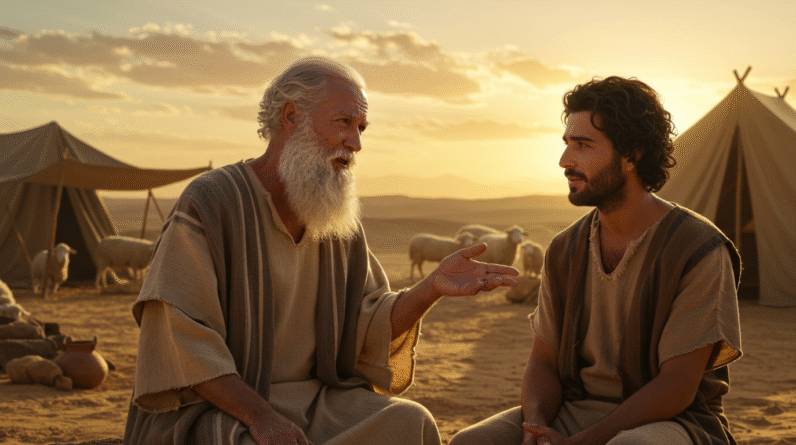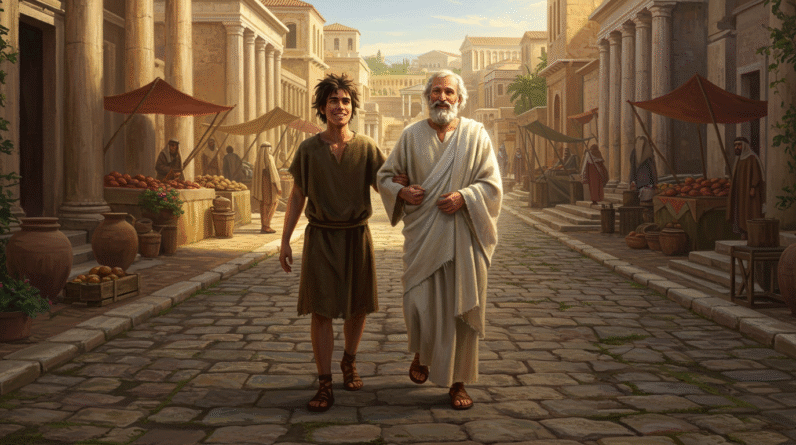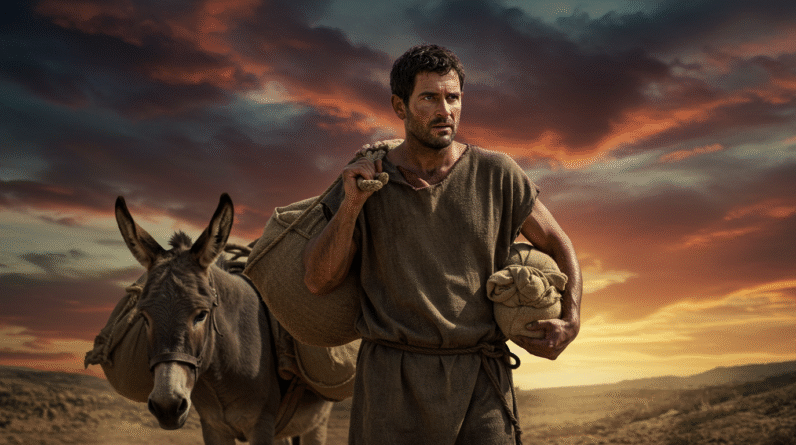Explore the profound transformation of King Manasseh—a tale of repentance and renewal revealing that change is possible even in the depths of moral decay.

The Redemption of Manasseh: A Story of Repentance and Renewal
Embark on a poignant journey through the life of King Manasseh, a figure whose story is etched deeply into the annals of the Bible. Manasseh, a fallen king redeemed by the grace of God, offers a powerful narrative of repentance and renewal. His account, found primarily in 2 Kings 21:1-18 and 2 Chronicles 33:1-20, serves as a luminous example for those seeking a path to redemption in today’s tumultuous world.
Introduction
Manasseh, the son of Hezekiah, ascended to the throne of Judah at the tender age of twelve. Despite his dynastic inheritance and the religious reforms of his father, Manasseh’s reign began amidst moral decay. He is notorious for leading his people astray, yet his story is ultimately one of hope and transformation—a beacon for those burdened by past transgressions.
Their Story in the Bible
Manasseh’s reign, spanning fifty-five years, was marked by profound wickedness and idolatry, earning him a dire reputation in the annals of Judah’s kings. Breaking away from his father’s pious ways, Manasseh rebuilt high places, erected altars to Baal, and even sacrificed his son, practices that are starkly condemned in the Scriptures. More than leading a nation into pagan worship, he filled the land with bloodshed and sorcery, directly scorning the God of Israel (2 Kings 21:1-9).
The turning point in Manasseh’s narrative arises when the Assyrians capture him, leading him away in bondage. It was in this depth of despair, confined in a Babylonian prison, that Manasseh finally turned back to God. Overwhelmed by the weight of his actions and their devastating consequences, he earnestly sought forgiveness. His sincere repentance was answered by divine mercy, resulting in his release and restoration to his kingdom (2 Chronicles 33:10-13).
Upon returning to power, Manasseh endeavored to undo his previous wrongs. He embarked on a mission to rid the land of idolatrous practices, restore the altar of the Lord, and encourage his people to worship the God of Israel once more. While the effects of his initial sins lingered, his later years were characterized by efforts to bring about spiritual renewal and healing (2 Chronicles 33:14-17).
Lessons from Their Life
From Manasseh’s story, several timeless lessons emerge, resonating powerfully with modern audiences. Firstly, no individual is beyond redemption. Despite the depths of his iniquity, Manasseh’s heart was softened by divine grace, showcasing the boundless forgiveness available to those who truly repent. His transformation underscores the potential for change, even in those who seem firmly set in their ways.
Manasseh also teaches us the importance of taking responsibility for past actions. By seeking to mend what he had shattered, he demonstrates a heartfelt commitment to positive change. In acknowledging his failings and striving for restoration, he embodies the power of genuine repentance—a vital step for anyone seeking to repair the damage of past mistakes.
Secondly, Manasseh’s legacy serves as a stark reminder of the consequences of leading others astray. Leaders bear a heavy responsibility, as their actions can profoundly influence those they guide. His initial failures and subsequent redemptive actions both impacted his nation, illustrating the broader effects of leadership choices.
Connection to Today’s World
In a world teeming with moral complexities and ethical challenges, Manasseh’s narrative holds significant relevance. How often do individuals or communities find themselves mired in wrongdoing, facing the seemingly insurmountable consequences of their choices? Manasseh’s story offers hope that change is possible, regardless of the severity of past transgressions.
The modern world is rife with leaders at various levels, from global figures to heads of families, who wield influence over countless lives. Manasseh’s life warns of the potential impact—both good and bad—that their decisions can have. Furthermore, it encourages leaders to seek divine wisdom and keep their moral compasses aligned with ethical and spiritual values.
For individuals grappling with personal failures, Manasseh’s journey underscores the importance of seeking forgiveness and embracing transformation. In an era where public figures and ordinary individuals alike often face public judgment for their pasts, his story reassures us that new beginnings are achievable with sincere repentance.

Key Bible Verse
“But when in distress he entreated the favor of the Lord his God and humbled himself greatly before the God of his ancestors.” (2 Chronicles 33:12)
This verse is pivotal, encapsulating Manasseh’s moment of true transformation. It highlights his humility and desperate plea for God’s grace, marking the turning point from rebellion to redemption. His decision to turn towards God, even when entangled in dire circumstances, serves as a powerful testament to the efficacy of earnest repentance.
Thought-Provoking Question
In moments of personal or communal crisis, do you honestly seek humility and divine guidance, as Manasseh ultimately did, to foster genuine change and redemption?
Historical/Cultural Context
Understanding Manasseh’s era is crucial to grasping his narrative. During his reign, Assyria’s domination influenced the religious landscape of Judah, often pressuring kings to adopt foreign gods to secure political alliances. This context sheds light on why Manasseh initially succumbed to idolatry, yet his return to the faith of his predecessors is even more striking in light of these external pressures.
Comparison with Other Characters
Like King Saul, whose reign was marred by poor decisions, Manasseh initially faltered under the weight of authority. However, unlike Saul, who could not alter his tragic end, Manasseh embraced repentance, demonstrating that recognition of one’s sins coupled with a desire for correction can change the trajectory of destiny. This comparison illustrates the importance of humility and seeking God’s forgiveness.
Prayer
Heavenly Father, as we reflect upon the life of Manasseh, may we find courage and determination in his journey from darkness to light. Help us to recognize our shortcomings, seek your forgiveness, and make amends with a sincere heart. Guide us as individuals and leaders, ensuring our choices align with your will and serve to nourish the souls of those we influence. Amen.
For further reflection on Manasseh’s story, immerse yourself in the full chapters linked above. Each verse is a wellspring of wisdom, offering profound insights into the human condition and divine forgiveness.







